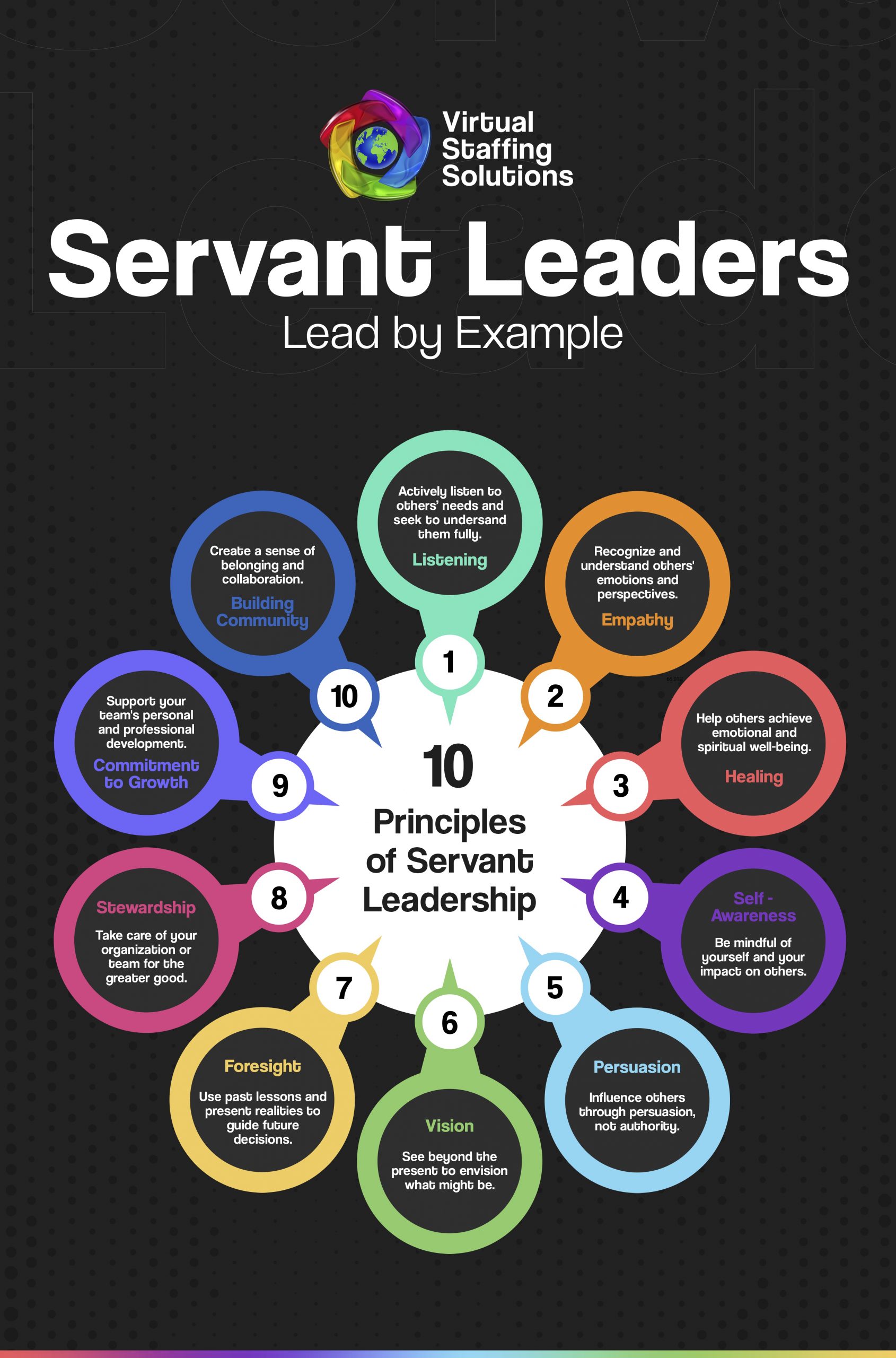🔍 Servant Leaders: Leading by Example Through the 10 Principles of Servant Leadership 🌟
Sent by the Learning & Development Team
Hello Team Leaders,
Servant leadership is a transformative approach to leadership that focuses on empowering and uplifting others rather than asserting power and control. Practicing servant leadership can create a positive and productive environment where your team thrives. Let’s explore the 10 Principles of Servant Leadership and how you can integrate them into your daily leadership practices to lead by example and inspire those around you.
The 10 Principles of Servant Leadership
1. Listening:
- Why it matters: Active listening builds trust, ensures clarity, and fosters a culture of respect and collaboration. It shows that you value your team’s input and care about their perspectives.
- Steps to Mastery:
- Practice Reflective Listening: Repeat what you’ve heard to confirm understanding.
- Encourage Open Dialogue: Create an environment where team members feel safe sharing their thoughts and concerns.
- Seek Feedback Regularly: Ask for feedback on your listening skills and adjust accordingly.
2. Empathy:
- Why it matters: Empathy involves recognizing and understanding the emotions and experiences of others. It helps build deep connections and foster a supportive workplace.
- Steps to Mastery:
- Put Yourself in Their Shoes: Try to understand situations from your team members’ perspectives.
- Acknowledge Emotions: When a team member expresses feelings, validate their emotions and offer support.
- Create Empathetic Policies: Implement policies considering employees’ well-being and personal challenges.
3. Healing:
- Why it matters: Helping others achieve emotional and spiritual well-being can build a more resilient and cohesive team.
- Steps to Mastery:
- Be Available for Support: Know you’re there to listen and help.
- Encourage Self-Care: Promote a culture of work-life balance and emotional well-being.
- Provide Resources: Offer access to wellness programs, counseling, or mindfulness practices.
4. Self-Awareness:
- Why it matters: Being mindful of your actions and how they impact others is crucial for personal growth and effective leadership.
- Steps to Mastery:
- Regular Self-Reflection: Take time to reflect on your decisions, behaviors, and their impact.
- Seek Honest Feedback: Encourage others to provide constructive feedback on your leadership style.
- Understand Your Strengths and Weaknesses: Work on developing your strengths and addressing areas for improvement.
5. Persuasion:
- Why it matters: Influence through persuasion rather than authority fosters trust, commitment, and a sense of ownership among team members.
- Steps to Mastery:
- Build Strong Arguments: Use logic, facts, and examples to persuade rather than commands.
- Engage in Healthy Debate: Encourage constructive discussion to reach the best outcomes.
- Be Open to Other Views: Show a willingness to adapt your stance based on new information.
6. Vision:
- Why it matters: Seeing beyond the present and envisioning what might inspire and guide your team toward a shared goal.
- Steps to Mastery:
- Communicate a Clear Vision: Regularly share your vision and goals with your team.
- Align Individual Goals: Help team members see how their work contributes to the larger vision.
- Adapt as Needed: Be willing to refine your vision based on feedback and changing circumstances.
7. Foresight:
- Why it matters: Using past lessons and current realities to anticipate future outcomes helps in making informed decisions that benefit the team and organization.
- Steps to Mastery:
- Analyze Past Outcomes: Reflect on past successes and failures to identify patterns.
- Stay Informed: Keep up with industry trends and emerging challenges.
- Consider Long-Term Impact: Evaluate how decisions today will affect the future.
8. Stewardship:
- Why it matters: Taking care of your organization’s human, financial, and material resources for the greater good ensures sustainability and growth.
- Steps to Mastery:
- Promote Ethical Behavior: Model integrity and accountability in your actions.
- Encourage Sustainable Practices: Support initiatives that promote environmental and financial sustainability.
- Empower Others to Take Ownership: Encourage team members to manage resources responsibly.
9. Commitment to Growth:
- Why it matters: Supporting your team’s personal and professional development is critical to fostering a motivated and high-performing team.
- Steps to Mastery:
- Create Development Plans: Work with team members to identify growth opportunities.
- Provide Learning Opportunities: Encourage participation in training, workshops, and mentorship programs.
- Celebrate Milestones: Acknowledge and reward growth and development achievements.
10. Building Community:
- Why it matters: Creating a sense of belonging and collaboration within your team leads to stronger relationships and a supportive work environment.
- Steps to Mastery:
- Encourage Team Building Activities: Foster camaraderie through regular team events and bonding sessions.
- Create Open Communication Channels: Promote transparency and regular communication.
- Cultivate Inclusivity: Ensure all voices are heard and respected in team discussions.
Weekly Leadership Challenge
🌟 Practice the Principles of Servant Leadership:
- Select Two Principles to Focus On: Identify two principles you want to strengthen this week.
- Develop Specific Actions: Create concrete actions you can take each day to practice these principles.
- Reflect and Adjust: Reflect on how applying these principles impacted your team’s dynamics and seek feedback for continuous improvement.
By embracing these 10 principles of servant leadership, you can lead by example, inspire your team, and create a more collaborative and growth-oriented work environment. Let’s build a culture of servant leadership together! 🌟👥
